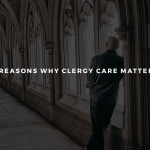In spite of my years of church attendance, ministry school, and genuinely following after my faith, I was once a very broken guy. I buried my pain deep and used external busyness to escape it. Years of self-neglect, along with lifelong patterns of shame and secret-keeping, landed me in ICU. A few days later I was transferred to a psych ward. I called it the arts and crafts floor: we colored, ate, talked, and rested a lot. The days I spent in there felt pointless, frustrating, and humiliating.
This was also my perspective of church for several years. I wondered what we were actually trying to accomplish. Sunday School curriculum felt disconnected from real life. We would dress up, sing a few songs, shake some hands, put money in a plate, listen to a professional, and go home to repeat the predictable and well-worn patterns as the week before. Why did any of it matter? Where was the life change?
After coming to the end of myself, I see how the church and the psych ward have several similarities and benefits.
They both understand the necessity of community. Think about this for a second: my life was changed by living in community – even for a short time – with unstable people at the lowest point of their lives. We came together for the social support of a safe place, and we shared a common goal. We all needed to get better. In the psych ward, our stories mattered, mutual support mattered, and finding our new normal mattered, but none of it was possible without the emotional safety we offered one another.
The same is true of the church.
Just as intake at the psych ward didn’t magically change my issues or perspective, paying my tithe or showing up every week didn’t bring me closer to faith on it’s own accord. I had to become invested in the process in order to find any personal benefit. In order to change my life, I had to answer the therapist’s questions honestly, figuring out how to piece a thousand fragments back together. In the same way, church did not instantly remove all of my doubts or struggles. But respecting the process and being honest about my issues with people I trust is shame-shattering. Accepting God’s grace for my own journey, past and present, has helped my soul find rest. In recognizing I have problems just like the person in the pew next to me, and asking for practical ways to work through them, I am finding true healing.
I am also finding that not everything at the psych ward applied to my specific experiences. It’s true with church, too. Not every sermon pierces my soul and not every program connects with me, but not every moment is about me. If I were to walk away from either one just because I am not catered to each and every time the doors open, I miss the point entirely.
As the nurse wheeled me down the long and lonely corridor and through the locked doors of that ward, I felt hopeless and humiliated. But on the other side, I found help for my anxieties, rest for my soul, and practical ways to walk toward my new life. On my own, without the hope Christ brings, I also find myself at the end of the rope, but in the context of healthy community, wrestling alongside others who have their own burdens to bear, I know I can keep going.
In both situations, I have found that outward exercises are not the end game. They are designed to lead us toward inward discovery. It’s not about raised hands on a Sunday morning any more than it’s about construction paper and glue stick collages of images that make me happy. Instead, the exercises are about disconnecting from unrealistic expectations, finding joy in ordinary moments, and giving ourselves space to love, belong, and constantly change. The psych ward changed my life. And so has the Church of Jesus Christ.
*Also published on The Huffington Post.
Looking for more fresh perspective on the Church?
Check out my latest on The Huffington Post, “Why I Stopped Hating the Church”.












